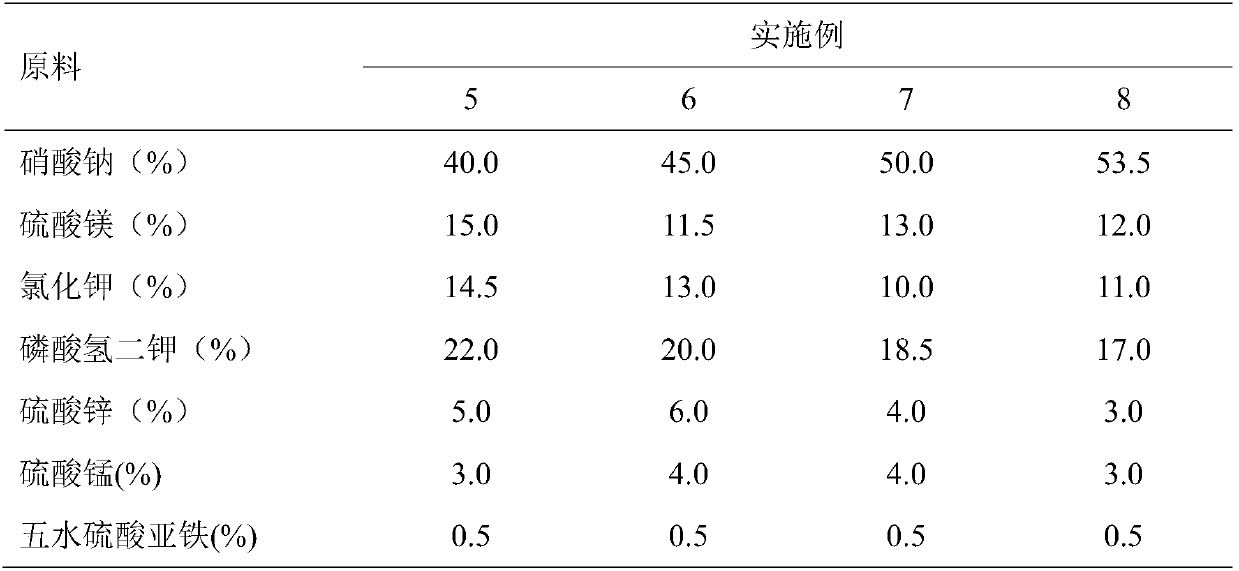AFG1 (Aflatoxin G1) toxin-producing fermentation method of aspergillus parasiticus
A technology of Aspergillus parasiticus and fermentation method, applied in the field of fermentation engineering, which can solve the problems of low AFG1 concentration, unevenness, and long time consumption, and achieve the effects of high spore activity, low production cost, and shortened cultivation time
- Summary
- Abstract
- Description
- Claims
- Application Information
AI Technical Summary
Problems solved by technology
Method used
Image
Examples
Embodiment 1-4
[0024] The preparation of embodiment 1-4 enrichment culture medium
[0025] A bacterium enrichment medium for Aspergillus parasiticus strains, after mixing the components shown in Table 1, adjust the pH value of the bacterium enrichment medium to 5.5-7.0 with hydrochloric acid and sodium hydroxide solution.
[0026] Table 1
[0027]
[0028]
Embodiment 5-8
[0029] The preparation of embodiment 5-8 compound mineral salt
[0030] Take sodium nitrate, magnesium sulfate, potassium chloride, dipotassium hydrogen phosphate, zinc sulfate, manganese sulfate and ferrous sulfate pentahydrate according to the ratio in Table 2, mix the above mineral salts evenly, and pulverize them through an 80-mesh sieve , mixed again for later use, to obtain the compound mineral salts described in the enrichment medium and solid fermentation medium.
[0031] Table 2
[0032]
[0033] Now take the compound mineral salt formula of embodiment 6 and the bacterium enrichment medium formula of embodiment 2 as examples, prepare 100g compound mineral salt and 1L bacterium enrichment medium.
[0034] Composite mineral salt (100g): take by weighing 45.0g sodium nitrate, 11.5g magnesium sulfate, 13.0g potassium chloride, 20.0g dipotassium hydrogen phosphate, 6.0g zinc sulfate, 4.0g manganese sulfate, 0.5g pentahydrate with analytical balance respectively Mix fe...
Embodiment 9-12
[0039] The preparation of embodiment 9-12 Aspergillus parasitica solid fermentation medium
[0040] According to the formula in Table 3, prepare the required solid fermentation medium.
[0041] table 3
[0042]
[0043] Raw material preparation: After crushing corn grits and peanut meal, it is required to pass through a 20-mesh standard sampling sieve, but not through a 40-mesh standard sampling sieve, that is, the particle size is between 20-40 mesh.
[0044] Now take the compound mineral salt formula of embodiment 6 and the component of embodiment 10 as example, prepare 100g compound mineral salt and 1L bacteria enrichment medium.
[0045] Composite mineral salt (100g): take by weighing 45.0g sodium nitrate, 11.5g magnesium sulfate, 13.0g potassium chloride, 20.0g dipotassium hydrogen phosphate, 6.0g zinc sulfate, 4.0g manganese sulfate, 0.5g pentahydrate with analytical balance respectively Mix ferrous sulfate in a beaker evenly, then put all the mixed mineral salts in...
PUM
 Login to View More
Login to View More Abstract
Description
Claims
Application Information
 Login to View More
Login to View More - R&D
- Intellectual Property
- Life Sciences
- Materials
- Tech Scout
- Unparalleled Data Quality
- Higher Quality Content
- 60% Fewer Hallucinations
Browse by: Latest US Patents, China's latest patents, Technical Efficacy Thesaurus, Application Domain, Technology Topic, Popular Technical Reports.
© 2025 PatSnap. All rights reserved.Legal|Privacy policy|Modern Slavery Act Transparency Statement|Sitemap|About US| Contact US: help@patsnap.com



